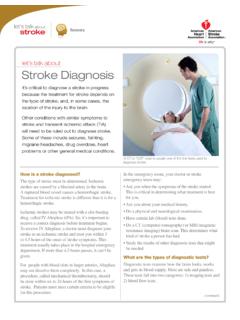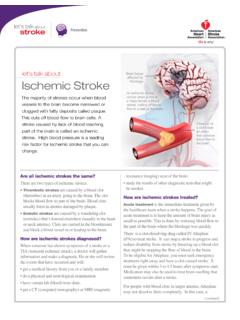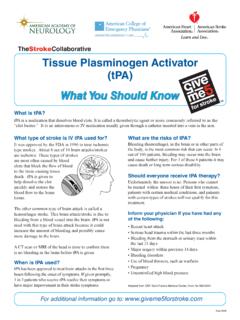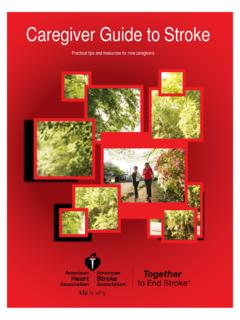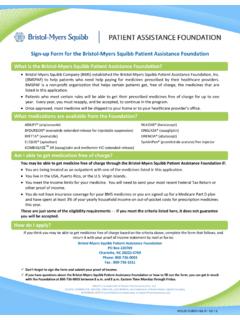Transcription of Playing Around - Stroke Association
1 September/October 2006 E V E R Y D A YConnecting You to Helpful Ideasard games, board games and puzzles may seem like child s play, but they are valuable tools in the hands of people who experience the cognitive and physical deficits frequently associated with and psychologists target deficits by using games to strengthen their patients weaknesses. Matching the game to the specific deficit is a key to rebuilding lost skills. You can use about any game, said Brenda Wilson, , associate professor of communication disorders and sciences at Eastern Illinois University in Charleston. You just have to understand what kind of cognitive demands and skills are involved with whatever you are using. Ho n i n g t H e Sk i l lSInability to pay attention is common for Stroke survivors.
2 Everyone who has any kind of brain injury, including Stroke , has trouble with attention in the first phases of recovery, Dr. Wilson learn how to pay better attention, Stroke patients can play games that require attention for example, a card game called War. It s a fairly simple game; the important thing is that you have to pay attention, said Ann V. Deaton, , who has worked in rehab psychology and neuropsychology at Sheltering Arms Hospital and Children s Hospital, both in Richmond, Va. (See the next page for descriptions of games mentioned in this article.)Attention is only one of the skills targeted in games. Others include speech, concentration, memory, word-finding and motor skills. In aphasia, damage to the language center of the brain can impair several of these skills.
3 Other deficits may include comprehension, reading and writing. For a lot of Stroke survivors, it s more an issue of concentration. Can they really persist and stay focused? Dr. Deaton said. That s when the card game called Concentration comes in handy. It requires finding matching cards and helps develop memory, as well. For Stroke patients, many times I ve used word-find puzzles because they can t do crossword puzzles, Dr. Wilson said. And we have workbooks with simplified crossword puzzles that list word choices. It helps with the word-finding problem, which is typical of people with aphasia. For speech and word-retrieval problems, Dr. Deaton likes the game Battleship. Players must practice speech by telling each other whether the opponent s shot was a hit or a miss.
4 Scattergories (junior version), which requires choosing words that start with a specific letter, also helps with language skills. She also suggests the card game Slapjack for helping improve motor skills. Players must use their arms and hands to slap cards, good therapy for those with weakness on one side of the body when they are asked to slap only with that RecoveryPlaying Around by Mike MillsSeptember/October 2006 5Ca r d ga m eSWarHow to Play: A card game for two to six players. Players take opponents cards by Playing a higher card until someone wins all the cards. Skills: Attention. Constant attention is necessary to keep track of each card s to Play: A card game for three to eight players in which players try to win all the cards by being the first to slap each jack as it is : Attention and motor skills.
5 Attention is required to identify a jack, and motor skills are needed to slap the card with the hand using only the affected side. ConcentrationHow to Play: A card game for two to six players. Cards are laid out face down in four rows of 13 cards. Players take turns turning over two cards at a time looking for a match. The player with the most matches : Memory and concentration. Not only is memory essential to match the cards, but players also must concentrate to stay rules for these three games and many others can be found at a r d ga m eSConnect FourHow to Play: A connecting game for two players. During each turn, a plastic disk is dropped into a slotted, upright grid of 49 spaces. The first player to stack four connecting disks vertically or horizontally or diagonally : Attention and motor skills.
6 Players must pay attention to two things at once, building their own line of four connecting disks and blocking their to Play: A board game for two players. Each player has a 100-block grid on which 10 ships of varying lengths are arranged. Another grid is used for guessing and tracking the location of the ships on the opponent s grid. Each player takes turns shooting at the opponent s ships by naming blocks on the grid until a player sinks all the opponent s ships. Skills: Language, planning, reasoning and fine motor skills. Players tell each other where shots are taken and which ships are hit and sunk and must insert pegs into the board and (Junior)How to Play: A board game for two to six players in which players try to list as many words as they can that start with a specific letter and fall within a list of categories.
7 For instance, foods, states, animals, cars and flowers that start with the letter S. Skills: Language, cognitive r d Pu z z l eSCrossword PuzzlesPuzzles of various skill levels are found in newspapers and : and FindBooklets available in grocery and other stores contain horizontal, vertical and diagonal rows of letters on one page and words to search for on the facing : Word-finding and gS a W Pu z z l eSChoose a puzzle that s a challenge but not too challenging. A 500-piece jigsaw puzzle may be too complicated and frustrating, yet the person may feel insulted by a simple puzzle that says on the box that it s for ages 3 to 5. Skills: Concentration and motor are descriptions of games and the skills they develop. September/October 2006 R e s o u r c e sE V E R Y D A YConnecting You to Helpful Ideasot H e r aC t i v i t i eSExtracting words: Generate as many words as possible from a given word.
8 Example: how many words can you form from rehabilitation ? tab, habit, rent, battle, hear, : Word-finding and , visual analogies: Supplying a missing piece in a pattern in speech, in a picture or in arranging words or letters. Here are a couple of examples:Fill in the blanks auditory analogy: Cow is to calf as dog is to _____? Visual analogy: _____? (How many dots logically follow the sequence of two dots, four dots and eight dots?)Skills: Language and visual W of t e n t o Pl ayDr. Deaton thinks rehab patients respond better when they are having fun, so play games as often as possible. What I love about games is that where most rehab-related homework from a therapist is really a chore, when you re able to use games to rehab someone s cognitive deficits, there are things available that they enjoy doing, she said.
9 So they practice more because they are not really working when they are doing it they re really Playing . The game may be something enjoyed in the past or a new discovery. One patient experienced physical and speech deficits, severely limiting his activities. We taught him to play simple card games, Dr. Wilson said. He had played cards earlier in his life, so we built on skills that he d already developed, and that turned out to be a real source of enjoyment because it was a way that he could interact with his family. mo d i f y i n g t H e ga m eOnce a therapist determines the survivor s performance level, the game can be made easier or more difficult and adapted to be played in a group or with another person. The biggest thing is for families to understand that if they can play one card game, they can t necessarily play another card game, Dr.
10 Wilson said. Therapists, especially occupational therapists and speech therapists, are better at knowing how difficult a task is for a specific patient, according to what his or her deficits are. That is not to say that games can t be tried at home. Outside of rehab sessions, family members and friends provide a familiar setting that may encourage more frequent participation. A Stroke survivor can enjoy building skills by Playing a simple game with a spouse or grandchildren without even thinking of it as therapy. The Together Rx Access Card will allow 36 million uninsured patients 80 percent of the uninsured population to access a broad range of prescription drugs and products at a savings of 25 40 percent at the pharmacy counter on 275 brand-name prescriptions.



